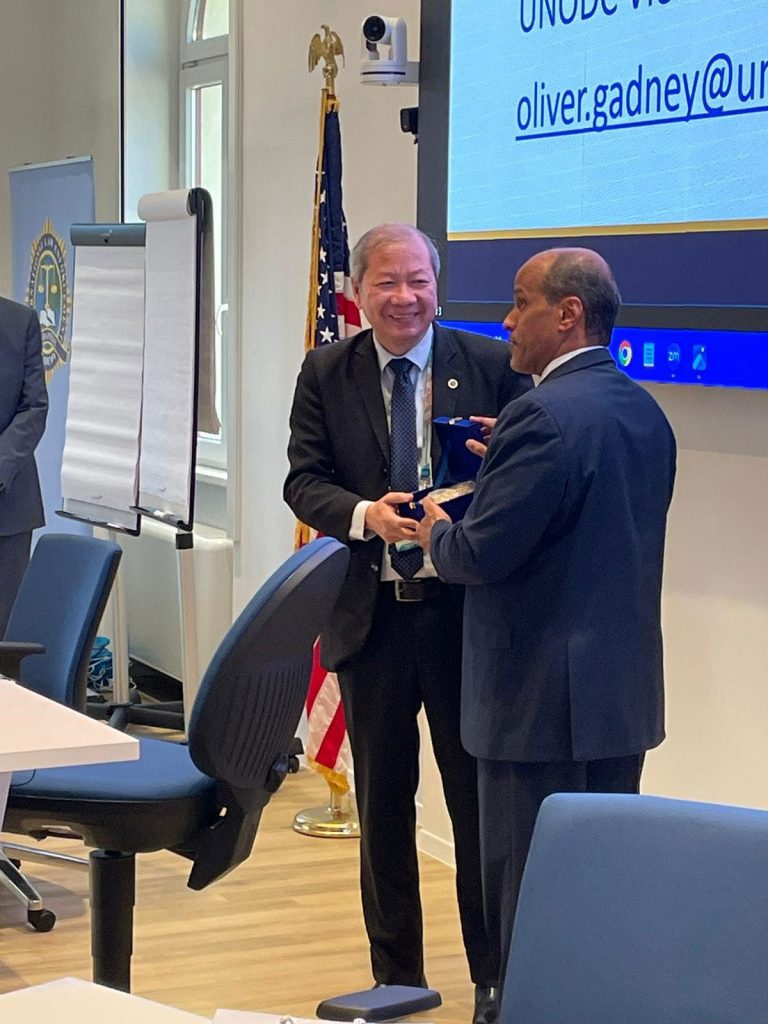Latest News Updates
The Middle East Drug Dialogue (MEDD) – Budapest, Hungary
The Middle East Drug Dialogue convened in Budapest, Hungary, from 15 – 16 October 2024, bringing together government representatives and international organizations from nine (9) Middle Eastern countries. Organized by the U.S. Department of State’s Bureau of International Narcotics and Law Enforcement Affairs (INL) and the Colombo Plan Drug Advisory Programme (CPDAP), in collaboration with the International Law Enforcement Academy (ILEA) – Budapest, this pivotal meeting aimed to address the increasing challenges posed by synthetic drugs in the region.
The dialogue opened with remarks from INL Deputy Assistant Secretary Maggie Nardi and Colombo Plan Secretary General His Excellency Dr Benjamin P. Reyes, who emphasized the importance of international collaboration to tackle the growing threats of drugs such as captagon. Through expert-led panel discussions, delegates explored global and regional trends in drug production, consumption, and trafficking, while sharing strategies for effective data collection, precursor control, and forensic analysis.
During the First Day – 15 October 2024, the meeting initiated with Panel One discussions on “Current Tools and Trends in Global and Regional Drug Production and Trafficking”, with insights from experts from the United Nations Office on Drugs and Crime (UNODC) Crime Laboratory and Scientific Services, the U.S. Drug Enforcement Administration (DEA), and the World Customs Organization (WCO). This was followed by Panel Two on “Regional Drug Consumption and Data Collection,” featuring presentations from UNODC’s Prevention, Treatment, and Rehabilitation Section, along with UNODC Regional Office for the Middle East and North Africa (ROMENA).
Day 01 also featured presentations from the representatives from the participating Middle East countries. Gulf Cooperation Council, Bahrain, Cyprus, Egypt, Jordan, Oman, Qatar, Saudi Arabia, and the UAE delivered national presentations, sharing their respective strategies, data collection methods, challenges, and collaborative suggestions for responding to synthetic drug issues.
The Second Day – 16 October 2024, initiated with the country presentation from Republic of Iraq. The second day included five thematic discussions. Discussion One on “Overview of Drug Demand Reduction”, featured experts from the International Society of Addiction Medicine (ISAM) and France’s Ministry of Foreign Affairs. Discussion Two on “Drug Strategy and Policy Development” led by UNODC. Discussion Three on “Precursor Chemical Control Strategies for Captagon and Methamphetamines” with insights from UNODC’s Passenger and Cargo Border Team (PCBT) and Germany’s Federal Criminal Police Office, Synthetic Drugs Unit. Discussion Four on “Forensic Toxicology and Drug Composition Analysis” presented by UNODC Laboratory and Scientific Services. And Discussion Five on “Review of Global intelligence Sharing Platforms, Addressing, Illicit Financial flows” with contributions from UNODC’s Global Programme against Money Laundering, Proceeds of Crime, and Financing of Terrorism (GPML).

The dialogue emphasized several key goals to address drug threats effectively. Enhancing Information Sharing was identified as crucial, focusing on real-time intelligence sharing related to synthetic drug production and trafficking routes. Capacity Building was also prioritized, aiming to expand training for law enforcement and health professionals on emerging drug trends, advanced treatment methods, and rehabilitation practices. Increased Cooperation among regional and international organizations was encouraged to streamline resources and share successful practices. Additionally, Precursor Control was addressed with recommendations to monitor precursor chemicals rigorously, perform both qualitative and quantitative forensic analyses, and promote drug profiling. Acknowledging the need for comprehensive analysis, experts emphasized testing for adulterants and cutting agents and recognized the critical role of forensic lab networks. Creating international legislative networks, establishing standard operating procedures, and fostering data collection initiatives were seen as essential steps to build early warning systems, unify investigations, and improve multilateral and bilateral cooperation. Further goals included Policy Harmonization, aligning national policies with international standards to enable cross-border enforcement and strengthen cooperation, and Drug Demand Reduction.
His Excellency Dr Benjamin P. Reyes delivered closing remarks, expressing sincere gratitude to the International Law Enforcement Academy (ILEA) – Budapest for generously providing the venue for the Middle East Drug Dialogue. He thanked all participating governments for their presence and their commitment to strengthening regional networking. Dr Reyes emphasized his belief that the threat of narcotic drugs and drug-related crimes in the region can be effectively addressed through close cooperation among member countries, grounded in mutual trust, friendship, and tireless efforts. In closing, he extended his appreciation to all delegates for their active participation and insightful discussions, which significantly contributed to the fruitful outcomes of the meeting.








